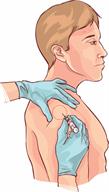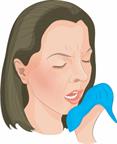Preventing Influenza, Adult
Influenza, also known as the flu, is an infection caused by a germ called a virus. It affects your respiratory system, which includes your nose, throat, windpipe, and lungs. The flu causes cold symptoms, as well as a high fever and body aches.
The flu is contagious, which means it spreads easily from person to person. You're more likely to get it during flu season, which goes from December to March. You can get the flu by:
Breathing in droplets when an infected person coughs or sneezes.
Touching something that has the germs on it and then touching your mouth, nose, or eyes.
How can the flu affect me?
Having the flu can lead to other infections. These may include:
If you get the flu, you may infect the people around you. The flu can be very serious for:
What can increase my risk?
You may be more likely to get the flu if:
You don't wash your hands often.
You have close contact with a lot of people during flu season.
You touch your mouth, eyes, or nose without first washing your hands.
You don't get the vaccine for the flu each year. This vaccine is also called the flu shot.
You work in health care.
You may be at risk for more serious flu symptoms if:
You're 65 years and older.
You're pregnant.
Your body's defense, or immune, system is weak.
You have a condition that makes the flu worse.
You're very overweight.
What actions can I take to prevent the flu?
Lifestyle
Keep your body's immune system strong. To do this:
Do not use any products that contain nicotine or tobacco. These products include cigarettes, chewing tobacco, and vaping devices, such as e-cigarettes. If you need help quitting, ask your health care provider.
Medicines

Get a flu shot each year. It's the best way to prevent the flu.
Try to get the shot as soon as you can in the fall. But getting a flu shot in the winter or spring instead is still a good idea. Flu season can last into early spring.
You need to get a new flu shot each year. This is because the germs that cause the flu can change slightly from year to year.
If you get the flu after you get the shot, the shot can make your illness shorter and milder. It can also stop you from getting other serious infections caused by the flu.
If you're pregnant, you can and should get a flu shot.
Check with your provider before getting a flu shot if you've had a reaction to the shot in the past.
You may be able to get the vaccine as a nasal spray instead. But the nasal spray may not work as well as the shot. Check with your provider if you have questions about this.
Most people who have the flu get better by resting at home and drinking lots of fluids. But a medicine called an antiviral may lessen your symptoms and make the flu go away faster.
General information
Practice good health habits. Good habits are key during flu season.
Avoid contact with people who are sick with flu or cold symptoms.
Wash your hands with soap and water often and for at least 20 seconds. If soap and water aren't available, use hand sanitizer.
Try not to touch your face, especially if you haven't washed your hands.
Clean surfaces at home and at work that may have germs on them. Use a cleanser called a disinfectant that kills germs.
If you get the flu:
Stay home until your symptoms, such as your fever, have been gone for at least 24 hours.
Cover your mouth and nose when you cough or sneeze.
Avoid close contact with others.
-
Centers for Disease Control and Prevention (CDC):
cdc.gov
-
Contact a health care provider if:
-
You have the flu, and you get new symptoms.
-
You have watery poop, or diarrhea.
-
You have a fever.
-
Your cough gets worse.
-
You make more mucus.
These symptoms may be an emergency. Get help right away. Call 911.
This information is not intended to replace advice given to you by your health care provider. Make sure you discuss any questions you have with your health care provider.
 Get a flu shot each year. It's the best way to prevent the flu.
Get a flu shot each year. It's the best way to prevent the flu.
